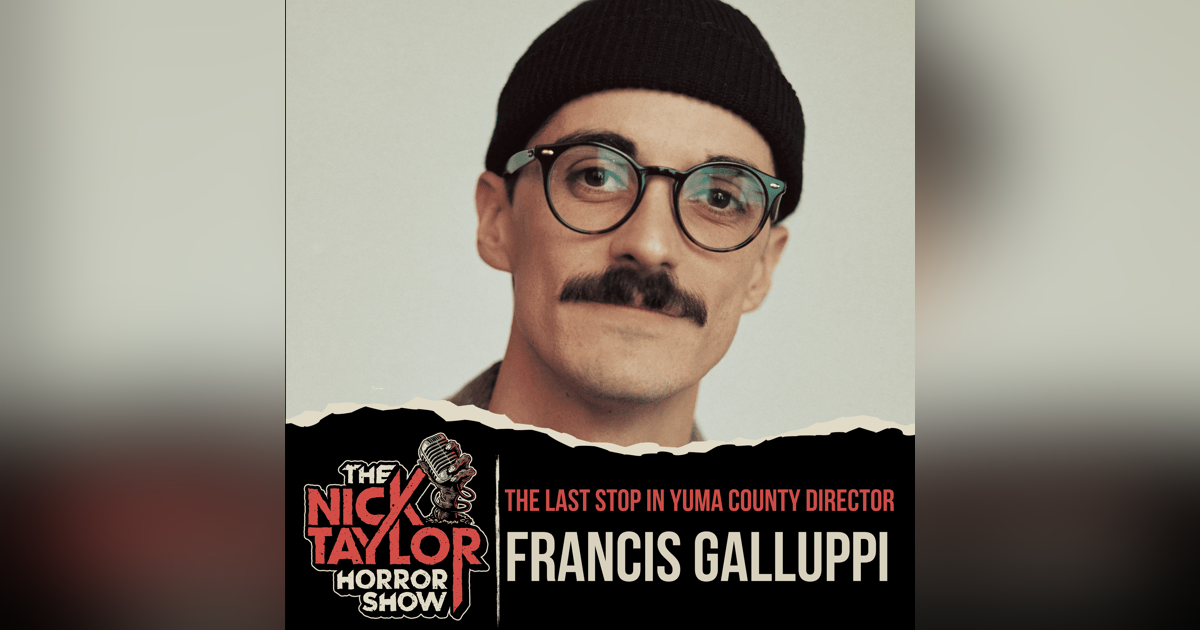THE LAST STOP IN YUMA COUNTY Director, Francis Galluppi

Welcome to the Nick Taylor Horror Show!
As always, each episode of The Nick Taylor Horror Show explores how today's horror filmmakers are getting their movies made while deconstructing their methods and career strategies into practical insights that you can use on your own horror filmmaking journey. This includes their creative processes, funding resources, favorite books & tools, key life lessons, and much much more.
Francis Galluppi is the director of The Last Stop In Yuma County, a southern-fried, hard-boiled crime thriller that plays within the traditions of Tarantino, The Cohen Brothers, Taylor Sheridan, and Elmore Leonard while still establishing a feel and style all its own. I loved this movie - it’s a fun, lean and mean piece of cinema bolstered by an incredible ensemble cast including Richard Brake, Jim Cummings, Jocelin Donahue, Barbara Crampton and many more.
The Last Stop in Yuma County is Francis’ feature debut and the film caught the eye of Sam Raimi and ultimately led to Francis being handed the reins of an upcoming installment in the Evil Dead franchise which is really awesome news.
Prior to Last Stop in Yuma County, Francis’ short film High Desert Hell, won several awards, including the Wes Craven Award at the Catalina Film Festival in 2019 while his followup, The Gemini Project, won Best Science Fiction/Fantasy Short Film' at the Burbank International Film Festival in 2020.
In this conversation, Francis and I get into the grueling story behind the making of Last Stop in Yuma County, which was a four plus year labor of love involving blood, sweat, tears, and mortgaged houses. This is an excellent account of true indie filmmaking, the importance of preparation, working with an all-star cast, and never giving up. I owe a big thank you to my friend David Guglielmo for putting me in touch with Francis, thank you David. Now, please enjoy my conversation with Francis Galluppi.
Prepare Extensively: Preparation was crucial to Francis' process, and his level of prep was extensive and very impressive. Every shot was meticulously storyboarded and diagrammed with detailed blocking directions made months before production began. Ultimately, this prep enabled him to achieve complex and high-production value work on a relatively low budget. Francis also engaged in extensive conversations with the actors, fully fleshing out the script and characters and every line of dialogue over zoom. By the time everyone arrived on set, the team was well-prepared to hit their marks which is critical on a lower budget. Francis’ process demonstrates that there’s no such thing as over-preparing. All of this ensured a fairly smooth production and Francis’ ability to pivot when things went wrong.
Set a Deadline and Make It Happen: Francis stresses the importance of setting a hard deadline and committing to it. Waiting for perfect conditions or resources can delay or prevent the realization of a project. He emphasizes the importance of prepping before you’re greenlit, which may seem counterintuitive to filmmakers hesitant to invest time in a project that may not happen. However, extensive preparation increases the likelihood of your film coming to fruition. This preparation not only creates a sense of reality and momentum for your project but also impresses producers and investors, making your project appear more tangible and ready to go and ultimately easier to greenlight.
Edit Your Own Work. Francis quickly mentioned that early on directors should edit their own work because doing so is a valuable learning experience. It forces you to confront your mistakes and understand what works and what doesn’t about your shooting style and directorial capability. Being able to be objective at this level will ultimately make you a better filmmaker.
Movies Mentioned:
- Evil Dead
- Funny Games
- The Vast of Night
- I Care A Lot
- Back to the Future
- Star Wars
- The Texas Chain Saw Massacre
Tools & Resources:
- Canon T2i camera
- Shot Designer
- SketchUp
- ShotDeck
Key Quotes:
- "It's a miracle that any movie gets made, and there's a million different ways to get a movie made."
- "Nobody is ever going to care as much as you care, and you have to act that way."
- "Set a hard deadline and just go out and make it. Don't wait until you have everything perfect."
Follow Francis Galluppi at:
- Instagram: https://www.instagram.com/francisgalluppi
- X (Twitter): https://twitter.com/FrancisGalluppi
- Website: https://francisgalluppi.com
- Vimeo: https://vimeo.com/francisgalluppi
- IMDb: https://www.imdb.com/name/nm6885026







